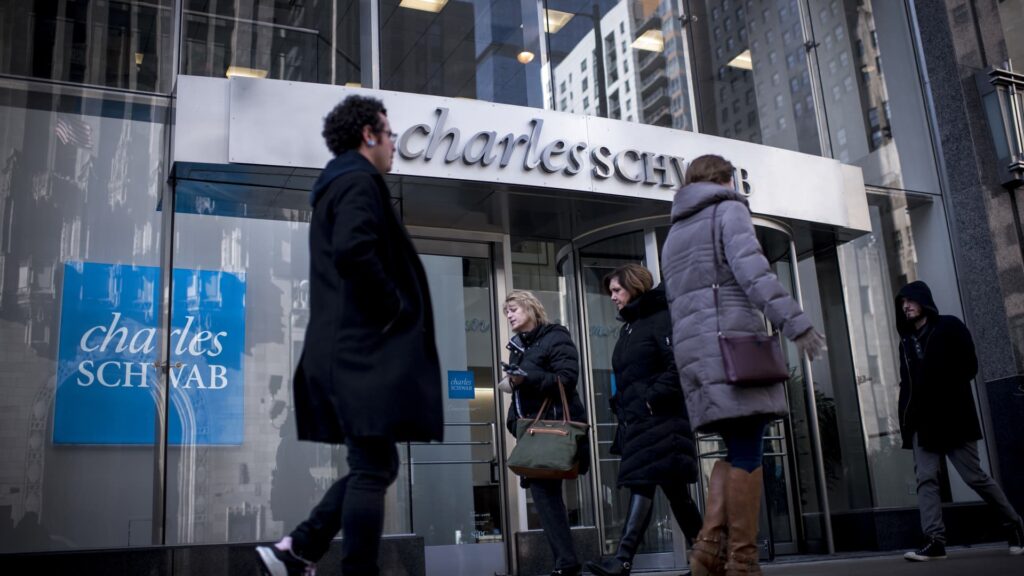Pedestrians pass in front of a Charles Schwab bank branch in downtown Chicago, Illinois.
Christopher Dilts | Bloomberg | Getty Images
Charles Schwab shares cut steep losses on Monday as the financial institution defended its portfolio, easing fears of a banking crisis in the aftermath of tech-focused Silicon Valley Bank‘s and crypto-related Signature Bank‘s collapses.
The Westlake, Texas-based financial company last fell about 11% after dropping as much as 23.3% earlier. The stock was at one point on track for its worst one-day sell-off ever.
Schwab was taking hits along with other financial firms with massive bond holdings of longer maturities. The fear is that these firms, like Silicon Valley Bank, would need to sell these holdings early at large losses in order to cover deposit withdrawals. But Schwab in its update sought to reiterate that it has plenty of access to liquidity and a low loan-to-deposit ratio.
“Focusing attention on unrealized losses within HTM (Held-to-Maturity portfolio) has two logical flaws,” Schwab said. “First, those securities will mature at par, and given our significant access to other sources of liquidity there is very little chance that we’d need to sell them prior to maturity (as the name implies).”
“Second, by looking at unrealized losses among HTM securities, but not doing the same for traditional banks’ loan portfolios, the analysis penalizes firms like Schwab that in fact have a higher quality, more liquid, and more transparent balance sheet,” the firm added.
Schwab also noted that more than 80% of its total bank deposits fall within the insurance limits of the Federal Deposit Insurance Corp., adding it has “access to significant liquidity” and its business continues to “perform exceptionally well.”
‘Compelling entry point’?
Schwab is the eighth-biggest U.S. bank by assets with $7.05 trillion in client assets and 33.8 million active brokerage accounts at the end of 2022. Because of its retail brokerage deposit model with ample liquidity, some Wall Street analysts think it won’t face a run like SVB did.
“Due to robust supplemental liquidity sources, we think it is very unlikely that SCHW will ever need to sell HTM securities to meet deposit withdrawal requests,” Richard Repetto of Piper Sandler said in a note Monday. The analyst maintained his overweight rating.
Meanwhile, Citi analyst Christopher Allen upgraded Schwab to buy from neutral, saying that the company’s shares have limited risk of deposit flight risk and current valuation levels present a “compelling entry point.”
Schwab’s shares are down 36% in 2023, off 43% from their 52-week high.
SVB’s collapse marked the largest U.S. banking failure since the 2008 financial crisis — and the second-biggest ever. Banking regulators rushed to backstop depositors with money at SVB and now shattered Signature Bank, seeking to ease systemic contagion fears.
First Republic Bank saw a more severe sell-off on Monday, down more than 70%, after it said Sunday it had received additional liquidity from the Federal Reserve and JPMorgan Chase.


